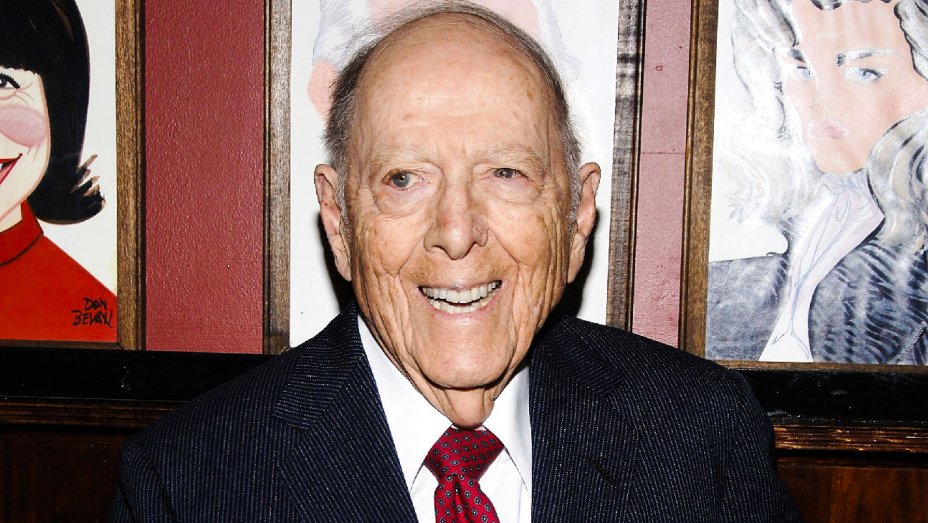Herman Wouk, the author of the Pulitzer Prize-winning novel The Caine Mutinythat became a Broadway hit and then a Columbia Pictures classic that starred Humphrey Bogart in a career-defining performance, has died. He was 103.
Wouk died Friday in his sleep at his home in Palm Springs, his literary agent Amy Rennert told the Associated Press.
Wouk also wrote The Winds of War and War and Remembrance, two historical novels about World War II that were published in 1971 and 1978, respectively, and transformed into ratings-grabbing 1983 and 1988 ABC miniseries that featured Robert Mitchum as U.S. Navy Captain Victor “Pug” Henry.
Wouk’s 1955 novel, Marjorie Morningstar, became a Warner Bros. movie three years later that starred Natalie Wood as a middle-class Jewish girl living in the Bronx in the 1930s who wants to be an actress.
Earlier, he co-wrote the screenplay for Slattery’s Hurricane (1949), a melodrama about a pilot starring Richard Widmark, Linda Darnell and Veronica Lake. It then came out as a paperback novel in 1956.
Wouk enlisted in the U.S. Navy following the attack on Pearl Harbor on Dec. 7, 1941, and eventually served as an officer aboard two destroyer minesweepers, the USS Zane and the USS Southard.
He called upon that experience to write The Caine Mutiny, first published in 1951, and then adapted it for Broadway. The play bowed at the Plymouth Theatre as The Caine Mutiny Court-Martial in January 1954 and, directed by Charles Laughton, ran for more than a year.
The stage version starred Lloyd Nolan as the paranoid leader of the fictional USS Caine, Lt. Com. Philip Francis Queeg, the role inhabited by Bogart in the 1954 film; Henry Fonda as Lt. Barney Greenwald (Jose Ferrer in the movie); John Hodiak as Lt. Stephen Maryk (Van Johnson); and Robert Gist as “the real author of the Caine mutiny,” Lt. Thomas Keefer (Fred MacMurray).
The Caine Mutiny feature, helmed by Edward Dmytryk from a screenplay by Stanley Roberts, was nominated for seven Oscars — including best picture and best actor for Bogart — but won none.
Wouk’s final book was Sailor and Fiddler: Reflections of a 100-Year-Old Author, released in January 2016. It was meant to invoke his writing career (the “Sailor” part) as well as his Jewish spiritual journey (the “Fiddler”).
“The ideas don’t stop just because one is old,” he once said. “The body weakens, but the words never do.”
Herman Wouk (pronounced woke) was born on May 27, 1915, in the Bronx, a son of Russian Jewish immigrants. At 19, he earned a bachelor of arts degree from Columbia University in 1934 and then came up with gags as a “script boy” for famed radio comedian Fred Allen from 1936-41.
However, Wouk said he eventually got “very tired of the joke writing. I thought there was more to do, but I didn’t know what to do besides that,” he said on CBS Sunday Morning in July 2017.
“I found my feet as a writer in the Navy. I was no longer trying to be funny or anything, I just reported the facts. That’s what the Navy gave me.”
His first published novel was 1947’s Aurora Dawn, a satire of the high-powered elite in Manhattan, followed a year later by City Boy: The Adventures of Herbie Bookbinder, about a young Jewish kid.
He then wrote The Traitor, a 1949 melodrama for Broadway about a nuclear physicist who feels that the only way to world peace is to share secrets with the U.S.S.R.
The Caine Mutiny, which won the Pulitzer Prize for Fiction, was No. 1 on The New York Times’ best-seller list for 32 weeks starting in 1951 and stood at the top for another 15 weeks the following year.
Next came Marjorie Morningstar (1955), which put Wouk on the cover of the Sept. 5, 1955, issue of Time magazine and on the CBS game show What’s My Line?
Wouk also provided the stories for the films First Romance (1951), starring Margaret O’Brien, and Confidentially Connie (1953), with Johnson and Janet Leigh, and he wrote the 1957 Broadway comedy Nature’s Way, starring Bea Arthur and Orson Bean.
In the 1960s, Wrote penned Youngblood Hawke, a 1962 novel about a young writer that was adapted two years later for a Warner Bros. drama starring James Franciscus and Suzanne Pleshette, and the Caribbean-set 1965 comedy Don’t Stop the Carnival, which Jimmy Buffett used as the basis for a 1998 album and short-lived musical.
The Winds of War miniseries ran for nearly 15 hours over seven nights in February 1983, and each installment attracted an average of 80 million viewers. War and Remembrance, the Emmy winner for best miniseries, spanned 30 hours in primetime, reportedly cost more than $100 million to make and filmed concentration-camp scenes at Auschwitz.
An Orthodox Jew, Wouk had explored religion with his first work of nonfiction, 1959’s This Is My God (a phrase from Exodus 15:2), and he would focus more and more on Judaism in subsequent novels like Inside, Outside; The Hope; and The Glory.
Wouk wrote in a diary that he started in 1939 and by January 2016 had encompassed 100 bound volumes.
His wife of 65 years, Sarah, died at age 90 in 2011. She met her future husband when the USS Zane was undergoing repairs in San Pedro, California, and she would become his literary agent.
They had three children: Abraham, a 4-year-old who drowned in a swimming pool accident in 1951, Nathaniel (now Iolanthe) and Joseph.
(Excerpt) Read more in: The Hollywood Reporter





